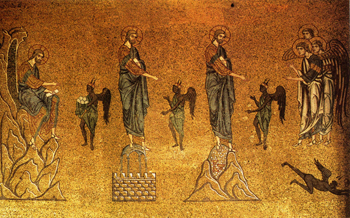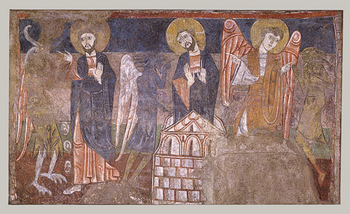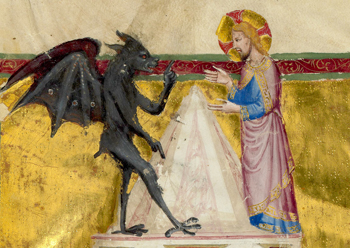My Flannel Graph Jesus
A guest essay by Debie Thomas. Thomas holds an MFA in Creative Writing from the Ohio State University. Her essays have appeared in the Kenyon Review, River Teeth: A Journal of Nonfiction Narrative, and Slate Magazine. She lives in the San Francisco Bay Area with her family.
For Sunday March 9, 2014
First Sunday in Lent
Lectionary Readings (Revised Common Lectionary, Year A)
Genesis 2:15–17; 3:1–7
Genesis 2:15–17
15 The Lord God took the man and put him in the Garden of Eden to work it and take care of it.
16 And the Lord God commanded the man, “You are free to eat from any tree in the garden;
17 but you must not eat from the tree of the knowledge of good and evil, for when you eat from it you will certainly die.”
Genesis 3:1–7
1 Now the serpent was more crafty than any of the wild animals the Lord God had made. He said to the woman, “Did God really say, ‘You must not eat from any tree in the garden’?”
2 The woman said to the serpent, “We may eat fruit from the trees in the garden,
3 but God did say, ‘You must not eat fruit from the tree that is in the middle of the garden, and you must not touch it, or you will die.’”
4 “You will not certainly die,” the serpent said to the woman.
5 “For God knows that when you eat from it your eyes will be opened, and you will be like God, knowing good and evil.”
6 When the woman saw that the fruit of the tree was good for food and pleasing to the eye, and also desirable for gaining wisdom, she took some and ate it. She also gave some to her husband, who was with her, and he ate it.
7 Then the eyes of both of them were opened, and they realized they were naked; so they sewed fig leaves together and made coverings for themselves.
Psalm 32
Psalm 32
Of David. A maskil.
1 Blessed is the one
whose transgressions are forgiven,
whose sins are covered.
2 Blessed is the one
whose sin the Lord does not count against them
and in whose spirit is no deceit.
3 When I kept silent,
my bones wasted away
through my groaning all day long.
4 For day and night
your hand was heavy on me;
my strength was sapped
as in the heat of summer.
5 Then I acknowledged my sin to you
and did not cover up my iniquity.
I said, “I will confess
my transgressions to the Lord.”
And you forgave
the guilt of my sin.
6 Therefore let all the faithful pray to you
while you may be found;
surely the rising of the mighty waters
will not reach them.
7 You are my hiding place;
you will protect me from trouble
and surround me with songs of deliverance.
8 I will instruct you and teach you in the way you should go;
I will counsel you with my loving eye on you.
9 Do not be like the horse or the mule,
which have no understanding
but must be controlled by bit and bridle
or they will not come to you.
10 Many are the woes of the wicked,
but the Lord’s unfailing love
surrounds the one who trusts in him.
11 Rejoice in the Lord and be glad, you righteous;
sing, all you who are upright in heart!
Romans 5:12–19
Romans 5:12-19
12 Therefore, just as sin entered the world through one man, and death through sin, and in this way death came to all people, because all sinned—
13 To be sure, sin was in the world before the law was given, but sin is not charged against anyone’s account where there is no law.
14 Nevertheless, death reigned from the time of Adam to the time of Moses, even over those who did not sin by breaking a command, as did Adam, who is a pattern of the one to come.
15 But the gift is not like the trespass. For if the many died by the trespass of the one man, how much more did God’s grace and the gift that came by the grace of the one man, Jesus Christ, overflow to the many!
16 Nor can the gift of God be compared with the result of one man’s sin: The judgment followed one sin and brought condemnation, but the gift followed many trespasses and brought justification.
17 For if, by the trespass of the one man, death reigned through that one man, how much more will those who receive God’s abundant provision of grace and of the gift of righteousness reign in life through the one man, Jesus Christ!
18 Consequently, just as one trespass resulted in condemnation for all people, so also one righteous act resulted in justification and life for all people.
19 For just as through the disobedience of the one man the many were made sinners, so also through the obedience of the one man the many will be made righteous.
Matthew 4:1–11
Matthew 4:1-11
1 Then Jesus was led by the Spirit into the wilderness to be tempted by the devil.
2 After fasting forty days and forty nights, he was hungry.
3 The tempter came to him and said, “If you are the Son of God, tell these stones to become bread.”
4 Jesus answered, “It is written: ‘Man shall not live on bread alone, but on every word that comes from the mouth of God.’”
5 Then the devil took him to the holy city and had him stand on the highest point of the temple.
6 “If you are the Son of God,” he said, “throw yourself down. For it is written:
“‘He will command his angels concerning you,
and they will lift you up in their hands,
so that you will not strike your foot against a stone.’”
7 Jesus answered him, “It is also written: ‘Do not put the Lord your God to the test.’”
8 Again, the devil took him to a very high mountain and showed him all the kingdoms of the world and their splendor.
9 “All this I will give you,” he said, “if you will bow down and worship me.”
10 Jesus said to him, “Away from me, Satan! For it is written: ‘Worship the Lord your God, and serve him only.’”
11 Then the devil left him, and angels came and attended him.
The first time I heard the story of Jesus' Temptation, I was fidgeting in the Sunday School classroom of a tiny New England church. My teacher, a grandmotherly woman in a hairnet and beige panty hose, had the Judean wilderness stretched across a flannel graph board in front of our first-grade class. At the far left of the fuzzy felt landscape, an innocuous-looking devil — scrawny, red-suited, and fork-tailed, stooped in the sand, reaching for a loaf-shaped stone. To his right, a supremely undisturbed Jesus towered over the landscape in a pristine white robe, his finger pointed reprovingly at his tempter.
 |
The Temptations of Christ, 12th century mosaic at St Mark's Basilica, Venice. |
"As you can see," my teacher told us as she gestured towards the figure in red, "that pesky devil never stood a chance against the Lord Jesus. Do you know why? Because Jesus knew exactly who he was. He knew he was the Almighty Son of God. So the devil couldn't bother him."
She paused, looking us over as we tugged at our itchy Sunday dresses and clip-on ties. "Let me tell you what this story means," she said finally. "It means that as long as we know exactly who we are, as long as we trust in Jesus and believe we're his children, we will always defeat the devil, too! Do you understand?" "Yes," we said in unison, impatient for the Koolaid and cookies awaiting us at the end of the hour. "We understand."
Old lessons die hard. In the Christian tradition that raised me, Jesus's humanity was something to skirt around, something we affirmed in our creeds, to be sure, but something we avoided examining too closely. Yes, of course the Incarnation was real. Of course Jesus was tempted in every possible way, in order that he could sympathize with us in our weaknesses. But to linger too long over what his enfleshed life might have looked, smelled, tasted, and felt like? To consider the possibility that Jesus might have wrestled with who he was and what his mission entailed? Well, that would be unseemly. It would be destabilizing. It would be — oh, God forbid! — heretical.
Yet it is precisely the appalling messiness of humanity — both Jesus' and our own — that we grapple with during Lent. We begin on Ash Wednesday, acknowledging via the imposition of ashes that we will surely die, that our bodies will fail us no matter how cleverly we attempt to preserve them with medicine, exercise, cosmetics, or mindfulness.
From that austere beginning, we venture into the wilderness like Elijah, like Moses, like the Israelites after their exodus from Egypt. With ashes on our foreheads and mortality on our minds, we begin a hazardous journey inward, a journey to explore who Jesus is, who we are, and what our shared humanity requires of us now.
 |
The Temptation of Christ, ca. 1125. Hermitage of San Baudelio de Berlanga, province of Soria, Spain . |
The Jesus we encounter in the first week of our journey is a thirty-year-old carpenter who has hardly the strength left to stand, much less to tower over the withered landscape. As the writer of Matthew's Gospel puts it, this Jesus is "famished" after forty days of fasting and testing. Physically, he's at the end of his strength. Socially, he's alone and friendless. Spiritually, he is struggling to consolidate his identity as the glow of his baptism recedes into a hazy, pre-wilderness past.
Cue the devil. Not a benign fool in red tights, but a sinister exploiter of weakness, a brilliant questioner. "Can you be like God?," was the savvy question he posed to Adam and Eve in the lushness of the first garden. "Can you take hold of a higher wisdom, a keener knowledge, a more divine humanity?"
Now he comes to the exhausted Son of God, a clever inversion of those primordial questions ready on his lips: "Can you be fully human? Can you abdicate power? Exercise restraint? Work in obscurity? Can you truly bear the terror of what it means to be weak and mortal and human?"
I have to confess that well into my teens and early adult years, I didn't see what the big deal was with the devil's taunts. Jesus was starving, after all. Who would have cared, really, if he zapped a rock or two into bread? God was supposed to be Jesus' protector after all, an omnipotent commander of legions of angels. Why would it have been sinful for a son to call on the protective powers of his father? Jesus was the rightful ruler of all the earth's kingdoms, after all. Who would have had the right to protest if he simply demanded the worship that was his due?
Many years have passed since my six-year-old self sat in front of my teacher's muscular Jesus. I understand now, as I did not when I was a child, that the Incarnation must have involved genuine struggle, that Jesus' vocation must have come to him piecemeal, laced with ambivalence. Why else would the devil have targeted his humanity as he did? And yet, even as I'm grateful to believe in a God who knows human frailty, I still ache sometimes for that old Jesus on flannel graph. I ache for his divinity — the certainty of it, the mighty, magical promise of it — to overwhelm his humanity like a bright and reassuring halo. Why? Because embracing Jesus' full humanity requires that I confront my own.
If those forty days in the wilderness was a time of self-creation, a time for Jesus to decide who he was and how he would live out his calling, then here is what the Son of God chose: deprivation over power. Vulnerability over rescue. Obscurity over honor. At every instance in which he could have reached for the certain, the extraordinary, and the miraculous, he reached instead for the precarious, the quiet, and the mundane.
 |
Temptation of Christ 'Bible historiée toute figurée', Naples ca. 1350. |
There's nothing easy about affirming Jesus' choices. Indeed, sometimes I find them appalling. How often I prefer the miraculous intervention, the dramatic rescue, the long-awaited vindication. How often I find myself echoing the demands of the tempter: Feed me! Deliver me! Prove yourself to me! How often I find the restraint of God offensive.
But here I am, still, on a journey that will culminate a few weeks from now in the great miracle — and the great paradox — of Easter. As this week's reading from Romans reminds us, Jesus' "free gift" to humankind is rooted not in his power but in his sacrifice. This is the scandal the devil couldn't overcome. After all, in his acts of power — the miraculous healings, exorcisms, mass feedings and resurrections, how many people did Jesus save? One hundred? Five hundred? Two thousand? Not even the whole of Galilee. But in his abdication, his vulnerability, his restraint — in other words, in his quiet willingness to bear a cross — how many did he save? He saved the world.
Image credits: (1) Wikipedia.org; (2) MetMuseum.org; and (3) Tumblr.com.





